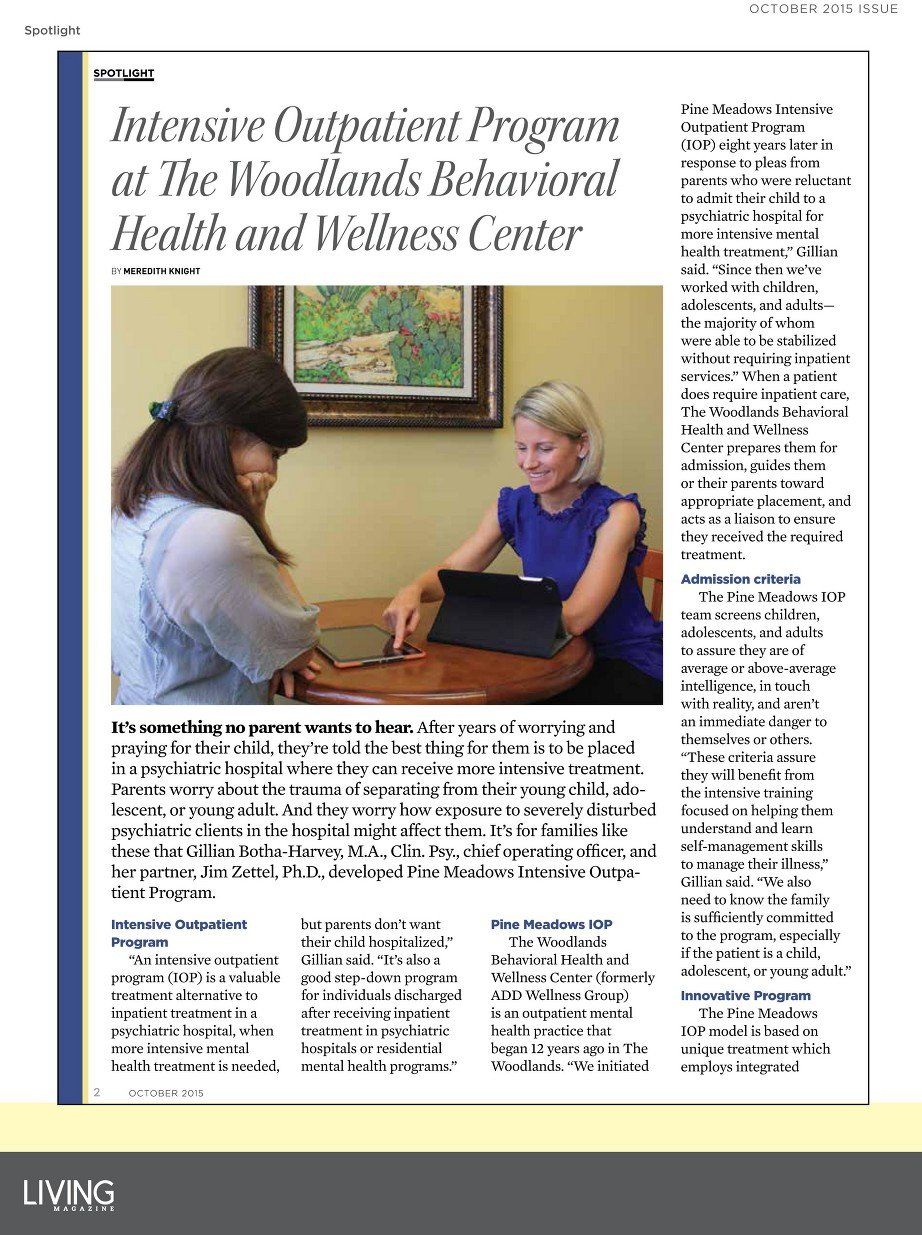Highlighted Treatment Programs
Comprehensive Programs
We have a variety of programs to help our patients. Our supportive and dedicated team puts your health and wellness first. We offer comprehensive testing and assessment, medication management, individual therapy, patient self-management skills training, life skills and academic coaching, and much more.
Comprehensive Assessments
and Testing
and Testing
If required, more in-depth cognitive, neuropsychological, personality, psychological or learning disability standardized testing can be conducted to make a more accurate diagnosis.
Vocational testing and guidance is also available for clients who are not sure of their career path and the academic requirements for those careers or those who want to change their career.
Through testing, the program is able to match careers with the client's interests, personality and aptitudes. Please call to schedule an appointment for testing and assessment.
Intensive Treatment Program
If you’re worried about a family member or child who needs intensive treatment, our team can help your loved one get the support and services they need, while providing care in the comfort of their own home. Our outpatient program helps families and patients to feel comfortable while receiving appropriate treatment. If a psychiatric hospital is not the route you’d like to take with your loved one, then please get in touch with us today to learn more about our Intensive Treatment Program.

The “Launch” Program for Young Adults

The Launch program helps young adults who have not achieved independence from their parents, due to mental illness such as depression, anxiety, ADHD, bipolar disorder or substance abuse. As part of this program, the young client and their family receive a combination of individual treatment, life and executive skills coaching, patient self-management skills training, support therapy group meetings, and family therapy, along with ongoing psychiatric follow-up.
A multidisciplinary treatment team works intensively with both the client and the family to develop skills to facilitate the young adult's independence. Under the guidance of the treatment team, the family sets up an “individual apartment” within the family home where the young adult with therapeutic support for their mental illness and special skills training learns to independently take responsibility for the management of their mental health or substance abuse issues and their general living until they are ready to transition to their own separate living environment.
An individualized treatment plan is customized for each young adult and their family after an initial assessment, which may include some of the following services:
Family Therapy and Parent Counseling
Family therapy is a critical part of this program to help the parents and family members stop enabling the young adult and facilitate their independence. Family therapy is also used to promote the young adult’s coping skills, improve communications between family members, resolve conflict, understand roles and set appropriate boundaries.
Medication Management
A psychiatric, complex medical evaluation or existing medication review by our adult, adolescent and child psychiatrist to identify whether medication could be used to treat the young adult's symptoms or determine whether their existing medication regime is effectively treating their symptoms. The psychiatric team (psychiatrist and nurse practitioner) will then closely monitor the client on a regular basis to determine whether they are benefiting from the medication prescribed or from changes or additions to his medication regime prescribed to target his symptoms.
Patient Self-Management Skills Training
Skills training to help the young adult take responsibility for managing their mental illness with the support of their doctor and therapist rather than just relying on their parents to intervene when they cannot care for themselves is a critical part of this program. Patient self-management skills training includes:
• Educating the young adult about their mental illness and how the treatment they are receiving actually works.
• Recognizing the importance of treatment compliance to prevent relapse.
• Maintenance of a routine that includes regular exercise, good sleep hygiene, and a healthy diet.
• Stress management skills and recognizing and avoiding stressful situations that will put them at risk for relapse.
• Recognizing the early symptoms which signal a relapse.
• Recognize the importance of early intervention and develop an intervention plan for when these early symptoms start.
Individual Therapy
We provide intensive individual therapy which may include Cognitive-Behavioral Therapy (CBT) and Acceptance and Commitment Therapy (ACT) techniques to promote identification of situations that trigger unwanted emotions or behaviors and thinking patterns resulting in negative emotions such anxiety, depression or frustration and behaviors such as substance abuse, anger outbursts or cutting, and then learning adaptive ways to manage these thoughts, including cognitive restructuring, behavioral activation, and mindfulness skills training, in order to cope with the trigger situations more effectively.
Life Skills Coaching
• Meal planning, grocery shopping, food preparation, kitchen skills, household upkeep and laundry.
• Financial management, budgeting and household shopping.
• Personal safety, hygiene, sleeping and organization.
• Essential social skills and self-advocacy.
Academic and Executive Skills Coaching for College or Career
Many young adults have ended up living at home after not coping with college due to mental illness or executive skill deficits in skills such as organization and planning, prioritizing, impulse control, emotional regulation, shifting from one activity to another, initiating and completing tasks, self-monitoring, time-management and working memory which have resulted in procrastination and the student becoming overwhelmed and failing. The initial assessment will identify any executive skill deficits, and executive skill coaching is provided to teach the client strategies and tools to compensate for the deficits identified. In addition to general academic support and encouragement, the coach is focused on the client's day-to-day challenges, including topics such as:
• Developing a timeline which includes assignment due dates and dates for tests and exams in order to successfully juggle college demands.
• Effective study habits, time management skills, organization, and planning ahead to meet deadlines.
• Completing research papers and projects using mind mapping software.
• Applying for academic accommodations if the client qualifies.
Relationship Skills/Young Adult Group
Participation in our young adult support group helps the client develop more effective social skills in a safe environment and helps the client to promote positive relationships and identification with similar-aged peers.
Ongoing Monitoring
The client's frequent contact with members of the treatment team allows the team to monitor the progress or changes and/or worsening in their symptoms as an essential component of their treatment.
Job Search/Job Maintenance Skills
In order to achieve more financial independence, the client learns job seeking skills. The counselor facilitates the client’s progress in applying and interviewing for a job then maintaining his job.
Out-of-Town Packages
The Woodlands Behavioral Health and Wellness Center is located in The Woodlands, Texas, which is north of Houston. International and Out-of-Town Packages are for clients with mental health issues who are located either in another part of Texas, in another state, or in another country. Packages include a condensed itinerary of scheduled appointments, which allow the client to travel to The Woodlands in order to complete assessments and initiate treatment over a limited number of consecutive days while they are staying at a hotel.
Prior to the travel, consultations and screenings are conducted via Skype and online to determine whether travel to The Woodlands for a comprehensive diagnostic assessment is necessary. After returning home, the client can continue treatment via Skype if desired.
• Complimentary consultation with client or client's parents via Skype to discuss the program, the client's assessment and treatment needs, fees, etc. An information package about the program is e-mailed to the client prior to the complimentary consultation.
• Client schedules Initial Assessment with payment of $300. Health and History Questionnaire and online rating scales are then e-mailed to client for completion by client, parents, and if necessary, client's teachers.
• Once the completed Health and History questionnaire and rating scales have been received, the Initial Assessment is conducted via Skype by a licensed psychologist or licensed professional counselor.
• Client receives a brief report containing results of the Initial Assessment, including rating scales, recommendations for treatment and a diagnosis or a rule-out diagnosis if comprehensive testing is required before a diagnosis can be confirmed.
• If travel to The Woodlands Behavioral Health and Wellness Center is recommended for a comprehensive assessment with standardized testing, an individualized Treatment Plan will be e-mailed to the client with the estimated fee. The client can adjust this plan, and once it is finalized, the client can schedule the assessment and treatment itinerary for the dates they will be available in The Woodlands, TX, United States. A 50% deposit for the total package fee must be made prior to confirmation of itinerary.
• A detailed itinerary, information about the airport, local hotels and directions to the Center will be e-mailed to the client.
• On arrival client (and parents) will be welcomed by Director or Program Manager to review itinerary and documentation regarding confidentiality, and consent for treatment etc. will be completed.
• At the end of scheduled itinerary, a verbal report and continued treatment recommendations will be given to client and parents. Additional treatment appointments can be scheduled either at the clinic or via Skype for when they return home.
• A comprehensive report with assessment and treatment results will be e-mailed to client/parents 2 weeks after completion of package.
Call today to schedule an initial Skype consultation.

